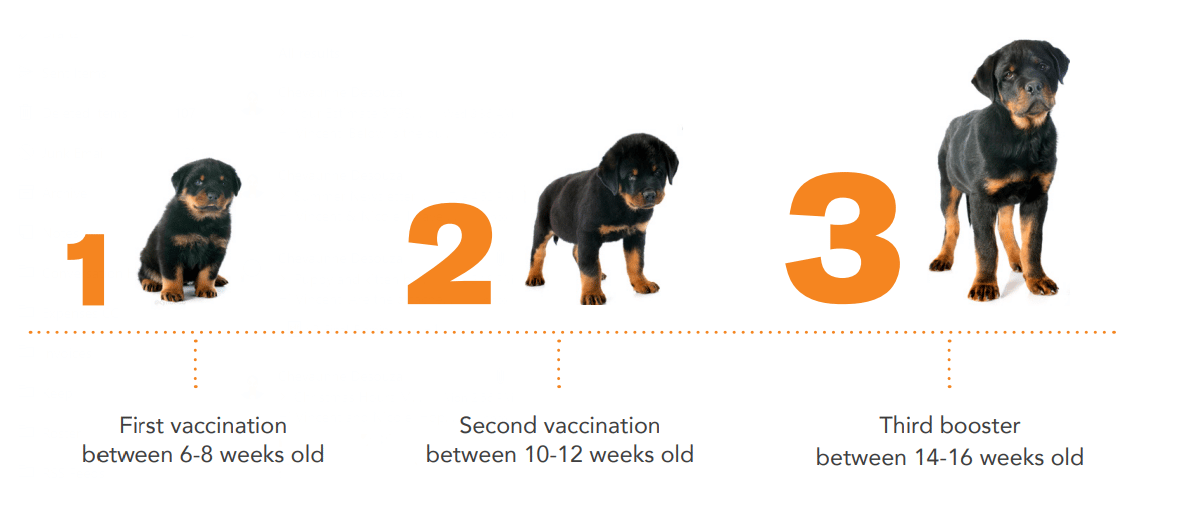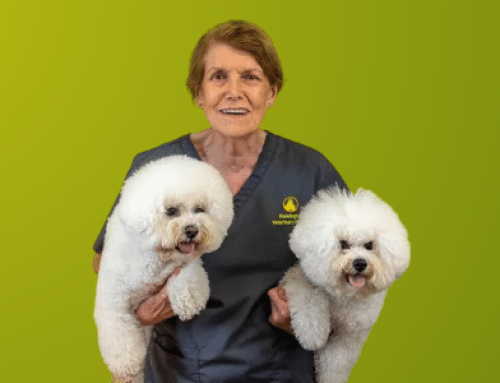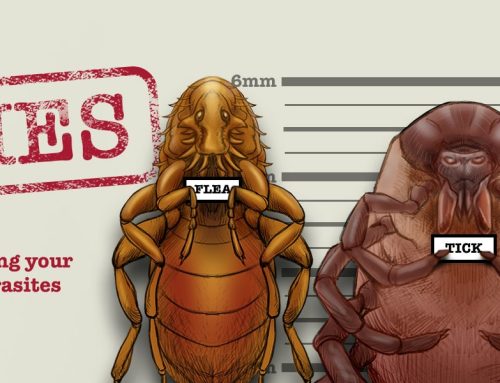Bringing a new puppy into the family is exciting. To give your new bundle of fur the best start in life, there are a few things we need to think about.
Our vets will cover much of this information and more during your puppy health visits.
Vaccinations
Vaccinations are the best way to protect your puppy from several dangerous diseases. We vaccinate puppies against canine parvovirus, canine distemper virus, infectious canine hepatitis, parainfluenza virus and Bordetella bronchiseptica.
Puppies are not considered 100% protected until at least 7 days after their final puppy vaccination. Until puppies are fully protected, they will be vulnerable to highly contagious diseases that can often be fatal.

Parasite control
In the Melbourne area, there are three categories of parasites that we need to protect our little ones against:
- Intestinal worms
- Heartworm
- External parasites (fleas, mites, lice)
1. Intestinal worms
Intestinal parasite infestations can cause your puppy to be unwell and, in very severe cases, can cause death. The worming schedule changes as your puppy gets older.
- Up to 12 weeks age – every 2 weeks
- 12 weeks to 6 months – every month
- > 6 months – every 3 months or monthly (if using a combination product)
2. Heartworm
Heartworms are deadly parasites that are transmitted from dog to dog through mosquito bites. Anywhere that mosquitos are found, dogs and puppies are at risk. Heartworm larvae develop through a dog’s blood stream and eventually reside in the blood vessels of the heart and lungs. A heartworm infection can eventually lead to lung disease and heart failure. Positive cases of heartworm in the Melbourne area are uncommon but they do happen. We still recommend protecting your dog from heartworm. This can be done via a Proheart injection (given at 12 weeks, 6 months then annually with vaccinations) or a monthly product.
3. External parasites
Common external parasites in the Melbourne area include fleas and mites. Fleas are the most common external parasite we see at the Flemington Vet Hospital. They can cause skin disease and allergic reactions. Flea prevention is recommended all year round. Ticks are not an immediate concern in Melbourne but they are a significant problem in other parts of the country. If you intend on travelling outside of Melbourne, have a chat to our team to see if tick prevention is required.
Choosing the correct anti-parasite products can be confusing. Our team can help you navigate through the options and help you choose the best product that is suited to you and your new puppy.
Microchipping
Puppies are usually microchipped before leaving the breeder or before adoption. The microchip number of your new puppy is linked to an online database. New pet owners should ensure that their details are linked to the microchip database. Some breeders or adoption agencies will register new pet owners directly, but some will provide a form for puppy owners to perform a change of ownership themselves. If your puppy does not have a microchip, out vets can implant one, but you will need to register for a breeder source number.
Read more on microchipping your dog.
Nutrition
We recommend feeding your puppy a premium-grade commercial puppy to meet their exact nutritional requirements. Premium brands generally contain higher quality ingredients and less fillers which means better nutrition for your growing pup! Up to 10 weeks of age, we recommend feeding your puppy three times per day. You can then reduce meals to twice daily after this. Most puppies should receive puppy food until 12 months of age. We recommend making any dietary changes gradually over 5-7 days to avoid any tummy upsets.
Desexing
Desexing in male and female dogs is recommended to prevent unwanted pregnancies but also several preventable health conditions. The time of desexing is dependent on the gender and breed of your puppy. Our vets can recommend the best time to desex your dog during your health visits but please read out guide to desexing.
Read more on desexing your dog.
Socialisation
Good socialisation is probably the most important thing that a new dog owner can do for their puppy. A well socialised puppy means an adult dog with good manners and less behaviour problems! Early exposure to different dogs, people, sights, smells, and sounds is very important for behavioural development. Here are some quick tips:
- Arrange play dates for your puppy – your puppy can safely socialise with any other vaccinated dog
- Arrange play dates with other people and children
- Take your puppy for car rides
- Ask your friends to dog sit your puppy – this allows your new puppy to be exposure to different environments and people
- Give your puppy alone time – this maybe in an outdoor space or a separate room. This develops independence. Give your puppy a toy or an activity to do so they feel comfortable being alone.
When can my puppy go outside?
Generally, puppies can safely visit any public area when they are fully protected by their vaccinations – this is one week after their final puppy vaccination. It is important to note that parvovirus, one of the vaccinatable diseases, can remain infectious in soil or hard surfaces for years. This means that your puppy does not necessarily need direct contact with an infected dog to become ill. Luckily, we see very few cases of parvovirus in our practice. This is likely due to the higher vaccination rates and lack of stray dogs in our area.
If you have any questions or would like a puppy health consultation with one of our vets, give us a call on (03) 9372 7655.





